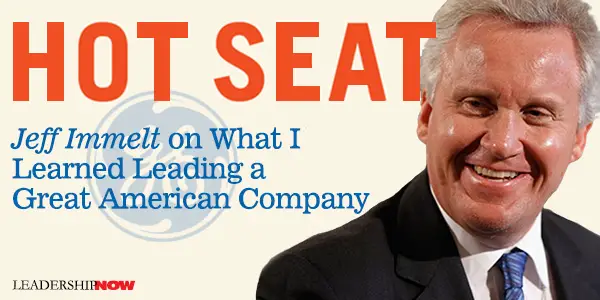 |
 |
04.23.21

Hot Seat: Jeff Immelt at GE
IN SEPTEMBER 2001, Jack Welch was a tough act to follow. The day after Jeffrey Immelt became CEO of General Electric, he had an even bigger challenge to deal with—the 9/11 terrorist attacks. Immelt states in Hot Seat: What I Learned Leading a Great American Company: The best leaders absorb fear. I’m not talking about soothing people by blowing smoke or giving false assurances. I’m talking about giving people the truth but also giving them a way forward. In the wake of 9/11, GE’s people needed to hear, and to believe, that we had a plan and that, working together, they could help us execute it. They didn’t need to hear that I was so agitated that I struggled to keep food down. That’s baptism by fire. Jack Welch led GE to some impressive numbers. In his twenty years as CEO, GE’s value had risen 4,000 percent. But numbers can hide looming issues until they don’t. GE had internal problems, it was overly reliant on GE Capital, and it was not digitally literate and innovative. And in 2001, the economic tailwinds that Welch enjoyed were about to shift. Much of what needed to be done at GE were long-term propositions. It’s always a challenge to help the naysayers within your own ranks, let alone helping the investors and pundits understand the value of what needs to be done. This was the case with GE Digital, a new subsidiary created to provide software and Industrial Internet of Things services to industrial companies. Tech start-ups define success, especially in the first decade, on how well they acquire customers, build capability, and penetrate their emerging markets. That wasn’t how GE had traditionally defined success. We were about increasing revenues and making our numbers. Analyzed by that metric, this little start-up within a big parent company was seen by many as a disappointment. Immelt gives us an inside look—the other side of the story—at what happened at GE while he was CEO. He reveals the complexities of running a global company of over 200,000 employees. I don’t think if Welch stayed on, it would have been much different. Times were changing, hidden problems were beginning to surface, and unforeseen events were to impact the nation. What Welch built was not sustainable. There were lapses in judgment (Yes, he talks about the chase plane) and mistakes made, to be sure, as he admits in this book. GE Capital should have been reined in faster for one thing. Acquisitions were made in an attempt to move GE in a new direction in accordance with the marketplace and to shore up businesses GE was already in. When stock value drops 30% on your watch, you can bet people are looking for a scapegoat. It’s easy to point fingers and have all of the answers from the sidelines, but when you’re actually in it working through the ambiguity, it’s another story. That should be a lesson for all of us. Some people point fingers in a crisis, others solve problems, and there’s very little overlap between these two groups. In a blaming culture, people can stop working in order to cover their own asses. If you can nurture an ethos of “all for one and one for all,” it can save your bacon. Good people will stand alongside you in a righteous fight. When you have a strong team, you can weather any crisis. Without that, you are lost. Jeff Immelt and his co-author Amy Wallace have written a very readable, inside look at Immelt’s 16 years as CEO of GE. There are many lessons and takeaways to be found inside. Immelt is now a partner at New Venture Associates, a Silicon Valley venture capital firm. He also lectures at the Stanford Graduate School of Business. “The media always look for a single person, a CEO or an entrepreneur, to personify the accomplishemnts of an entire company or industry. It makes good reading, but it’s simplistic.” 
Posted by Michael McKinney at 03:50 PM
|
BUILD YOUR KNOWLEDGE
 

How to Do Your Start-Up Right STRAIGHT TALK FOR START-UPS 
Grow Your Leadership Skills NEW AND UPCOMING LEADERSHIP BOOKS 
Leadership Minute BITE-SIZE CONCEPTS YOU CAN CHEW ON 
Classic Leadership Books BOOKS TO READ BEFORE YOU LEAD |